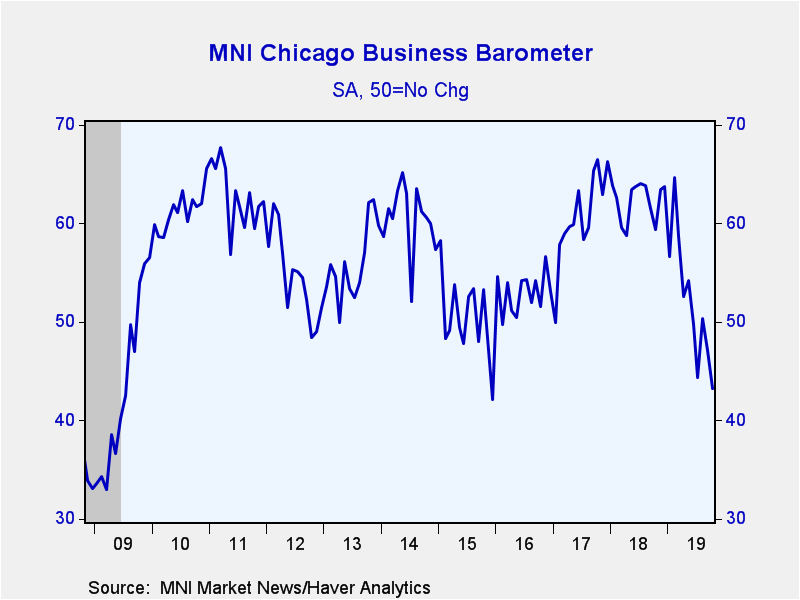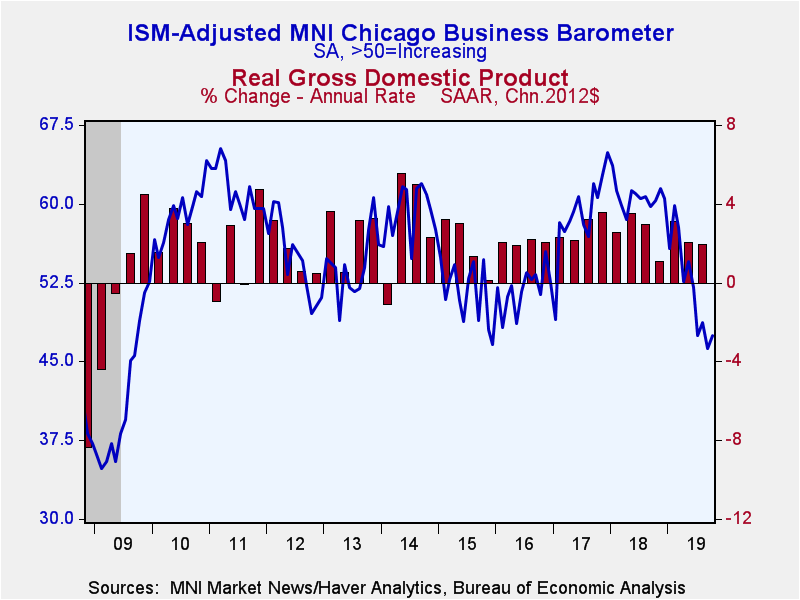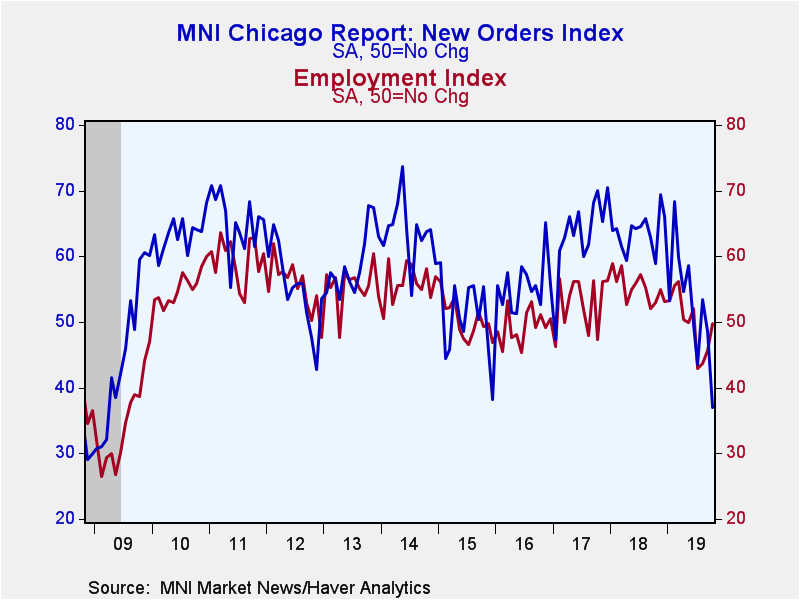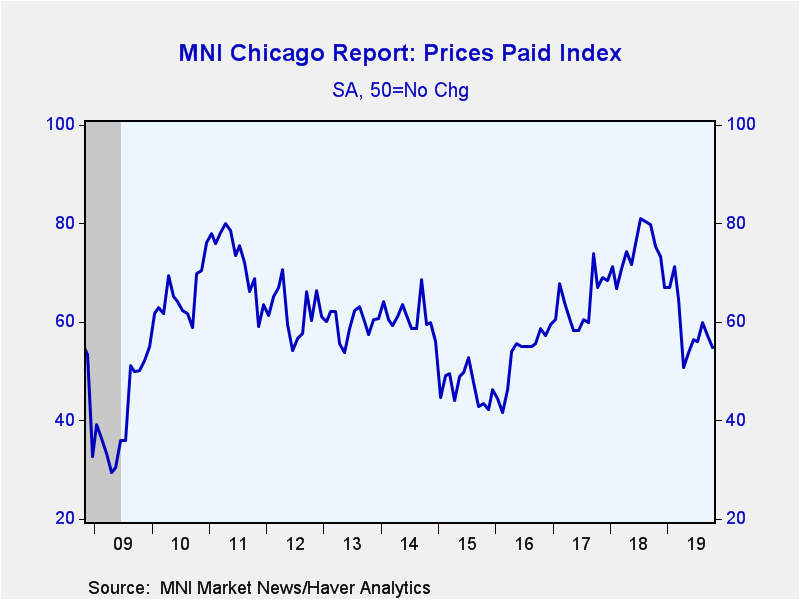 Global| Oct 31 2019
Global| Oct 31 2019Chicago Purchasing Managers Index Collapses
by:Tom Moeller
|in:Economy in Brief
Summary
The Chicago Business Barometer fell sharply to 43.2 during October from 47.1 in September. It was the fourth reading in the last five months below the break-even point of 50 and left the index at the lowest level since December 2015. [...]
The Chicago Business Barometer fell sharply to 43.2 during October from 47.1 in September. It was the fourth reading in the last five months below the break-even point of 50 and left the index at the lowest level since December 2015. Expectations had been for 48.0 in the Action Economics Forecast Survey. The Chicago Purchasing Managers figures are diffusion indexes where readings above 50 indicate growth.
Haver Analytics constructs an ISM-Adjusted Chicago Business Barometer with methodology similar to the ISM Composite Index scheduled for release tomorrow. This measure improved to 47.5 from 46.2, the fourth consecutive month below the break-even level of 50. During the last 15 years, the index has had a 59% correlation with q/q change in real GDP.
Movement in the sub-series was mixed this month with lower new orders and unfilled orders leading the decline. Production, inventories and the supplier delivery series moved higher, the latter indicating the slowest product delivery speeds in six months.
The employment index rose to 49.8 in October, remaining below break-even for the fourth straight month. The proportion of survey respondents reporting higher employment improved to 20%, the most in four months, The share with reduced employment fell to 20% and reversed the September rise. These share figures are not seasonally adjusted.
The prices paid index fell to 54.8, its lowest level in six months, well below the 75.3 reading twelve months earlier. The share of respondents paying higher prices fell to 18%, the least in six months, while those paying lower prices eased to 11%, still up from four percent one year earlier.
The MNI Chicago Report is produced by MNI in partnership with ISM-Chicago. The survey covers a sample of over 200 purchasing professionals in the Chicago area with a monthly response rate of about 50%. Summary data are contained in Haver's USECON database, with detail including the ISM-style index in the SURVEYS database. The Action Economics Forecast Survey is available in AS1REPNA.
| Chicago Purchasing Managers Index (%, SA) | Oct | Sep | Aug | Oct '18 | 2018 | 2017 | 2016 |
|---|---|---|---|---|---|---|---|
| General Business Barometer | 43.2 | 47.1 | 50.4 | 59.4 | 62.4 | 60.7 | 53.0 |
| ISM-Adjusted General Business Barometer | 47.5 | 46.2 | 48.7 | 60.3 | 60.7 | 59.0 | 51.9 |
| Production | 46.8 | 40.4 | 48.1 | 60.7 | 64.5 | 64.2 | 54.5 |
| New Orders | 37.0 | 48.5 | 53.4 | 58.9 | 63.8 | 63.6 | 55.6 |
| Order Backlogs | 33.1 | 46.8 | 51.3 | 51.5 | 58.0 | 55.2 | 47.1 |
| Inventories | 47.1 | 41.7 | 47.9 | 59.7 | 55.3 | 54.9 | 47.2 |
| Employment | 49.8 | 45.6 | 43.7 | 52.9 | 55.2 | 52.9 | 49.4 |
| Supplier Deliveries | 56.9 | 54.8 | 50.3 | 69.3 | 64.8 | 59.4 | 52.8 |
| Prices Paid | 54.8 | 57.3 | 59.8 | 75.3 | 74.0 | 64.1 | 53.2 |
Tom Moeller
AuthorMore in Author Profile »Prior to joining Haver Analytics in 2000, Mr. Moeller worked as the Economist at Chancellor Capital Management from 1985 to 1999. There, he developed comprehensive economic forecasts and interpreted economic data for equity and fixed income portfolio managers. Also at Chancellor, Mr. Moeller worked as an equity analyst and was responsible for researching and rating companies in the economically sensitive automobile and housing industries for investment in Chancellor’s equity portfolio. Prior to joining Chancellor, Mr. Moeller was an Economist at Citibank from 1979 to 1984. He also analyzed pricing behavior in the metals industry for the Council on Wage and Price Stability in Washington, D.C. In 1999, Mr. Moeller received the award for most accurate forecast from the Forecasters' Club of New York. From 1990 to 1992 he was President of the New York Association for Business Economists. Mr. Moeller earned an M.B.A. in Finance from Fordham University, where he graduated in 1987. He holds a Bachelor of Arts in Economics from George Washington University.
More Economy in Brief
 Global| Feb 05 2026
Global| Feb 05 2026Charts of the Week: Balanced Policy, Resilient Data and AI Narratives
by:Andrew Cates










